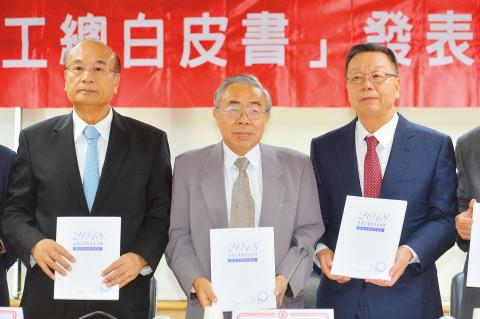The Chinese National Federation of Industries (CNFI, 工總) yesterday called on the government to value the nation’s manufacturing industry, as other sectors are not mature or big enough to drive economic growth.
“The US and China have sought to beef up their manufacturers in the pursuit of economic growth, but Taiwan is driving them away,” newly installed CNFI chairman William Wong (王文淵) said at the release of the trade group’s annual position paper.
Wong, also the chairman of the nation’s largest industrial conglomerate, Formosa Plastics Group (FPG, 台塑集團), expressed particular frustration over environmental, energy and labor regulations.

Photo: CNA
FPG, which primarily produces polyvinyl chloride (PVC) resins and other intermediate plastic products, has been blamed for poor air quality near its facilities and is waiting for regulatory approval of its capacity expansion plans.
US President Donald Trump has pledged to make the US great again by keeping manufacturing facilities onshore and Beijing has unveiled the “Made in China 2025” program, Wong said.
Bucking the trend, Taiwan has urged manufacturers to expand overseas, especially in Southeast Asia, to take advantage of cheaper land and labor costs there, Wong said.
He questioned the wisdom of the New Southbound Policy, as the government has not yet secured fair taxation, investment or personal safety protection pacts with countries in the region.
The trade group, which consists of 159 member associations and represents a majority of local manufacturing businesses, again pressed the government to push back the schedule of making the nation nuclear free from 2025 to 2050.
Renewable energy is not a reliable source and gas is not more environmentally friendly than coal, Wong said, adding that it would cost less to invest in reducing coal-related pollutants.
In any case, the nation needs more time to develop renewables and it is too risky to phase out nuclear power prematurely, with 120 short circuits reported so far this year, the group said.
A persistent lack of stable electricity, water, land, labor and talent supply has dampened investment interest in Taiwan, it said.
Wong said the government should refrain from unnecessary interventions in the labor market, adding that supply and demand would work out an equitable wage level for workers.
The average wage at FPG is NT$55,000 per month — much higher than the basic wage, Wong said.
Like the US and China, the government should create a more friendly environment for the manufacturing industry, which has underpinned GDP growth over the years, because agriculture and other sectors are too small to sustain the economy, he said.

MULTIFACETED: A task force has analyzed possible scenarios and created responses to assist domestic industries in dealing with US tariffs, the economics minister said The Executive Yuan is tomorrow to announce countermeasures to US President Donald Trump’s planned reciprocal tariffs, although the details of the plan would not be made public until Monday next week, Minister of Economic Affairs J.W. Kuo (郭智輝) said yesterday. The Cabinet established an economic and trade task force in November last year to deal with US trade and tariff related issues, Kuo told reporters outside the legislature in Taipei. The task force has been analyzing and evaluating all kinds of scenarios to identify suitable responses and determine how best to assist domestic industries in managing the effects of Trump’s tariffs, he

TIGHT-LIPPED: UMC said it had no merger plans at the moment, after Nikkei Asia reported that the firm and GlobalFoundries were considering restarting merger talks United Microelectronics Corp (UMC, 聯電), the world’s No. 4 contract chipmaker, yesterday launched a new US$5 billion 12-inch chip factory in Singapore as part of its latest effort to diversify its manufacturing footprint amid growing geopolitical risks. The new factory, adjacent to UMC’s existing Singapore fab in the Pasir Res Wafer Fab Park, is scheduled to enter volume production next year, utilizing mature 22-nanometer and 28-nanometer process technologies, UMC said in a statement. The company plans to invest US$5 billion during the first phase of the new fab, which would have an installed capacity of 30,000 12-inch wafers per month, it said. The

Taiwan’s official purchasing managers’ index (PMI) last month rose 0.2 percentage points to 54.2, in a second consecutive month of expansion, thanks to front-loading demand intended to avoid potential US tariff hikes, the Chung-Hua Institution for Economic Research (CIER, 中華經濟研究院) said yesterday. While short-term demand appeared robust, uncertainties rose due to US President Donald Trump’s unpredictable trade policy, CIER president Lien Hsien-ming (連賢明) told a news conference in Taipei. Taiwan’s economy this year would be characterized by high-level fluctuations and the volatility would be wilder than most expect, Lien said Demand for electronics, particularly semiconductors, continues to benefit from US technology giants’ effort

‘SWASTICAR’: Tesla CEO Elon Musk’s close association with Donald Trump has prompted opponents to brand him a ‘Nazi’ and resulted in a dramatic drop in sales Demonstrators descended on Tesla Inc dealerships across the US, and in Europe and Canada on Saturday to protest company chief Elon Musk, who has amassed extraordinary power as a top adviser to US President Donald Trump. Waving signs with messages such as “Musk is stealing our money” and “Reclaim our country,” the protests largely took place peacefully following fiery episodes of vandalism on Tesla vehicles, dealerships and other facilities in recent weeks that US officials have denounced as terrorism. Hundreds rallied on Saturday outside the Tesla dealership in Manhattan. Some blasted Musk, the world’s richest man, while others demanded the shuttering of his